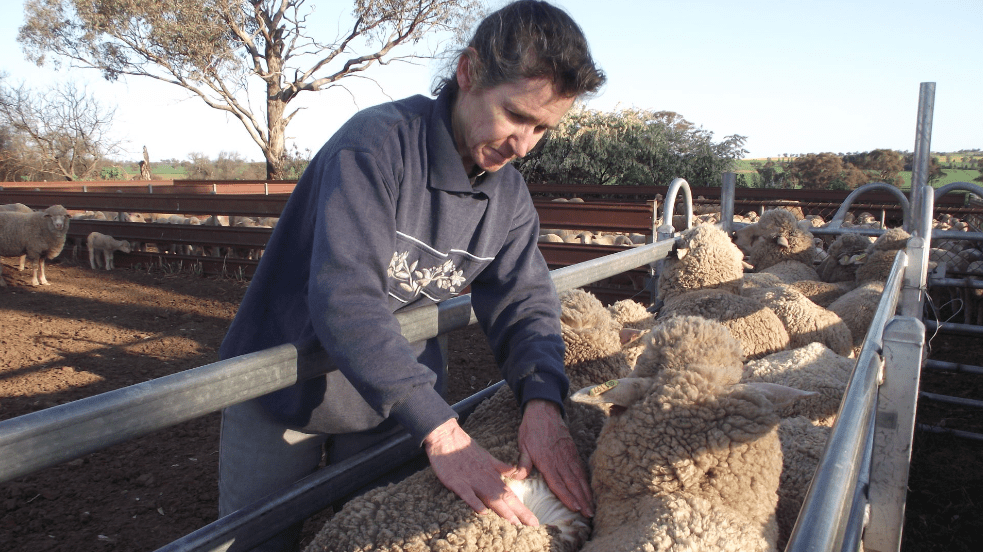
CSU senior research fellow Dr Susan Robertson is leading research into novel feeds, heat stress and confinement strategies.
NOVEL sheep feed supplements and strategies to minimise heat stress and maximise lambing success in confinement paddocks will be studied in a $2.2 million project at Charles Sturt University.
The Climate-Smart Agriculture Program grant will fund development of novel strategies that sheep producers can use to increase production, profit and resilience to climate variability while protecting natural resources.
Research leader Dr Susan Robertson said the project will assist in meeting goals for environmental sustainability while improving sheep production and profitability, so it will be a win-win for the industry and the environment.
Dr Robertson is the senior research fellow with the Charles Sturt Gulbali Institute for Agriculture, Water and Environment and senior lecturer in ruminant production with the Charles Sturt School of Agricultural, Environmental and Veterinary Sciences.
“The Charles Sturt research team has partnered with Green Blue Health and Four Seasons Company who will provide novel feed supplements, and also JM Livestock and MerinoLink to engage sheep producers,” she said.
“This co-design will help combine the project findings and information to then assist farmers’ decisions on profitable, sustainable practices.
“This assistance will be delivered through extension events facilitated by MerinoLink across six locations through New South Wales and Victoria, as well as through online national events.”
Dr Robertson said the strategies trialled will be focussed on strategies to mitigate the effects of heat stress, in grazing and confined feeding, but also on strategies to maximise success from breeding ewes in confinement, which may be unrelated to heat stress.
“Several trials will be conducted and they will include both novel supplements and other feeding/management strategies.”
She said heat stress already has a large potential impact on sheep reproduction since most producers either have ewes joining, pregnant and/or lambing over summer/autumn when it is hot.
“Heat is going to become more of a production barrier with global warming.
“We also need to be mindful that drought and dry periods will increase in severity and frequency.”
Dr Robertson said many locations are already challenged by our typical dry autumns in southern Australia.
“Reducing the risk of overgrazing which results in soil erosion and loss of pasture/vegetation is critical to maintaining land in a productive condition, and confined feeding is a known strategy to achieve this.”
Lambing ewes in confinement
Dr Robertson said it was not known how to successfully manage lambing ewes when confined, and this means they usually aren’t confined at that time.
“We need to develop methods that enable profitable production while protecting the land resource and which reduce methane emission intensity.
“As such, this project will test a range of strategies so that we can ideally find effective practices for a range of situations (grazed, confined, using supplements or not) so that there may be a suitable practice for most sheep producers to maximise benefits across the sheep industry, rather than just focussing on a single practice which is unlikely to suit everyone.”
She said confinement feeding is a key method to protect soils and pastures from over-grazing, but lambing in confinement is a practice most producers avoid.
“We need to work out what might work for Australian producers, because droughts are inevitable.”
Dr Robertson said there is a large extension component to present findings in terms of what practices are/are not profitable and productive, but also to provide opportunities for producers to learn about the sheep sustainability framework and impacts of different practices, and how they may benefit from these in terms of marketing or markets.
“MerinoLink is part of the project team to enable producer input into strategies trialled, and to facilitate the 6 events per year across a range of locations.”
Supplement trials
Dr Robertson said the first supplement trial will test a proprietary mix in a lick block that is known to improve production while cattle are heat stressed, but other supplements are likely to be trialled also.
“Supplements need to be matched to the animal stage for best results – at joining, at lambing, growing stock.
“Other supplements may also be trialled.”
The project intends to support the training of a PhD student, so what they trial is yet to be determined, Dr Robertson said.
She said the research will not be comparing the genetic makeup (ASBV profile) of individual sheep to their ability to handle heat stress, maximise performance on the novel feed supplements or successfully lamb in confinement.
“We aren’t investigating genetics.”
Minister for Agriculture, Fisheries and Forestry Julie Collins said the government was dedicated to supporting further adaption to climate change, in a way that boosts agricultural productivity, competitiveness and sustainability.
“Our farmers are productive and agile when finding ways of producing our food and fibre that reduce the impact on the land.
“These grants are designed to aid farmers, creating new opportunities to move from theory to adaptable practice.”